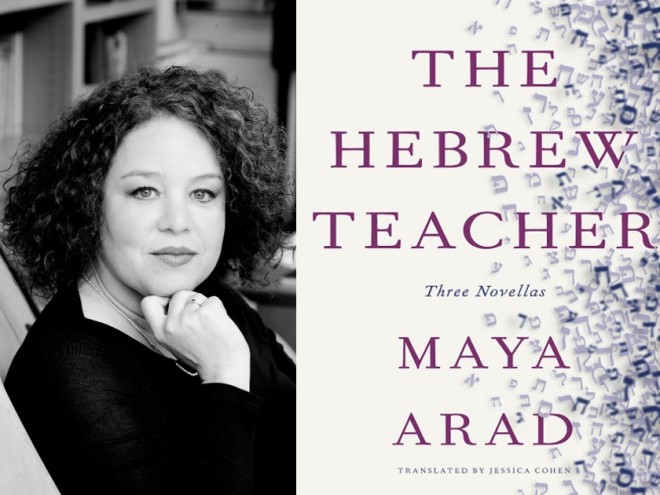According to many critics, Maya Arad is the most accomplished Hebrew-language writer living outside of Israel, and perhaps one of the best Israeli novelists of her generation. Throughout her eleven novels and books of short fiction, she has created deeply affecting and often wrenching portraits of the foibles of contemporary society, particularly those of middle-class families and academia. So while it’s a little surprising that The Hebrew Teacher is the first to be translated into English, it surely won’t be the last. Composed of three novellas centered on three Israeli immigrants to the United States (each woman is in a different phase of their acculturation to the new society), and the families, friends, and colleagues surrounding them, this book is bristling with insights into the sharp divides between cultures, and between generations.
The title story begins with the stark utterance: “It wasn’t a very good time for Hebrew.” Born in 1948, Ilana is an adjunct professor who has spent decades laboring on behalf of the language, music, and popular culture of her beloved Israel (or at least the 1990s-era society she once knew). She frets when a rising academic star (he dabbles in what he calls the “Jewish” Heidegger) who has only contempt for Israel — as well as for Ilana’s devotion to such causes as Hillel and Jewish adult education — is hired at her university. Ilana is an important figure, and the inevitability of her painful downfall and transformation into an embarrassing relic of the past seems to reflect both the decline of Hebrew-language enrollment and the Jewish state’s transformation into a global pariah. Yet despite Ilana’s professional humiliation, Arad brings most of her focus to bear on Ilana’s enthusiasm for a memoir-writing class. Ilana struggles to write at first (“Forty-five years outside of Israel and she has no language”), but eventually she succeeds in conjuring up precious fragments of a life that was not uneventful and not without meaning.
In both the collection’s subsequent novellas, Arad proves adept at rendering the often excruciating negotiations and balancing acts of married life and parenting. The domestic drama at the heart of “A Visit (Scenes)” is set off by the untimely visit of the husband’s aging Israeli mother, who inadvertently exposes the schism in her son’s marriage as she desperately strains to find a place for herself in the family’s affections. The clashing dynamics are explored through fragmentary vignettes that offer a bittersweet affirmation of the endurance of familial bonds. And in “Make New Friends,” bitter battles are waged over “screen time,” body image, and the betrayals and loneliness of middle school. This novella culminates with a jaw-dropping intervention when Efrat, a mother who wants only the best for her distressed daughter, crosses the line. Efrat’s startling yet utterly plausible response to her child’s unhappiness is guaranteed to make readers gasp — yet perhaps also nod their head in sad recognition.
Arad’s Israeli female characters struggle to find grace after personal and professional setbacks; and this memorable collection illuminates their tumultuous journeys with wisdom and compassion, achieving the kind of intimacy that may remind some readers of Grace Paley. Arad’s portraits of contemporary life achieve that rare balance between comedy and pathos, satire and empathy — often on the same page. The deeply affecting portrayals of various forms of estrangement, missed connections, and distances will likely linger in readers’ imaginations for a long time. The world of contemporary Israeli literature in English translation simply wouldn’t be the same without Man Booker International Prize winner Jessica Cohen’s exceptional work. Maya Arad’s penetrating voice is well served by Cohen’s sensitive and intelligent translation.
Ranen Omer-Sherman is the JHFE Endowed Chair in Judaic Studies at the University of Louisville, author of several books and editor of Amos Oz: The Legacy of a Writer in Israel and Beyond.




